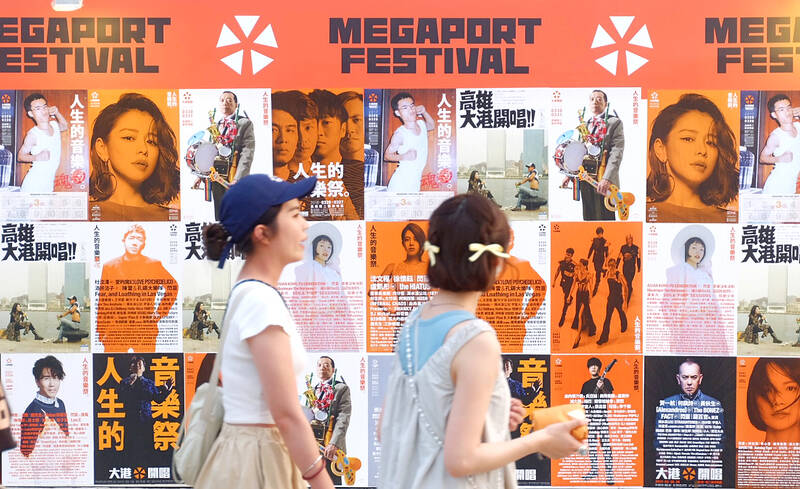Hundreds of young people were head-banging hard at the free stage of the Megaport Festival (大港開唱), the largest annual music event in Taiwan, held in Kaohsiung (高雄) at the end of last month.
Southeast Asian Punk quintet Southern Riot played several songs that really got the crowd going.
“I can’t understand what they say, but I feel their spirit,” says Lai Chien-te (賴謙德), an audience member from Tainan, sporting a Mohawk-hairstyle, boots and a Sex Pistols t-shirt.

Photo: Muhammad Irfan
Southern Riot is an Indonesian band based in Pingtung. The group was formed by several migrant workers and they’re not the only outfit of their kind to be made up of migrant workers. In fact, music made by that community is becoming quite a thing on the sonic landscape. Last year, Jubah Hitam, an Indonesian metal band based in Chiayi, also formed by Indonesian migrant workers, found themselves under the spotlight on the Megaport stage.
Fred Hsieh (謝宗翰) and Shawn Hsu (許瀧尹), the program directors of Megaport, say the participation of the migrant worker community at the festival reflects the social reality in Taiwan. They say Megaport is committed to giving different groups of people the space to express themselves musically and tell their story.
“I believe that bands formed by migrant workers and those formed in their home countries will have very different perspectives... which I think is something that Megaport Festival can continue to explore,” Hsu says.

Photo: Muhammad Irfan
Taiwan is geographically close to Southeast Asia, so the festival organizers hope Megaport can be a starting point for Taiwan’s younger generation to step out of their comfort zone and get to know their regional neighbors a bit better.
CULTURAL EXCHANGE
Wu Ting-kuan (吳庭寬), a cultural activist and researcher of the music made by migrant workers in Taiwan, appreciates Megaport commitment to cultural exchange and diversity. Before Megaport, migrant workers could only perform at corporate events, providing little scope for interacting with the local scene, he says.
“Their performances were not considered as primary content but only to promote the ideology of multiculturalism by the government, NGOs or companies, which is different from Megaport’s focus on their music,” Wu says.
Wu also appreciates how accepting local music fans are. However, he feels that by simply labelling them as “a migrant worker band” there is still some othering going on. Wu says that in the context of the music community, it would be better if bands were not categorized by their ethnic or class identity but simply by their music.
As a person who loves punk music, Lai says Southern Riot surprised him by the quality of their songs and hopes their presence on the festival bill will shine a more compassionate light on Taiwan’s migrant workers generally.
“Awareness of migrant workers and the issues they face is increasing,” says Lai. “But Taiwan has a lot of internal problems, including how migrant workers are treated.”

March 10 to March 16 Although it failed to become popular, March of the Black Cats (烏貓進行曲) was the first Taiwanese record to have “pop song” printed on the label. Released in March 1929 under Eagle Records, a subsidiary of the Japanese-owned Columbia Records, the Hoklo (commonly known as Taiwanese) lyrics followed the traditional seven characters per verse of Taiwanese opera, but the instrumentation was Western, performed by Eagle’s in-house orchestra. The singer was entertainer Chiu-chan (秋蟾). In fact, a cover of a Xiamen folk song by Chiu-chan released around the same time, Plum Widow Missing Her Husband (雪梅思君), enjoyed more

Last week Elbridge Colby, US President Donald Trump’s nominee for under secretary of defense for policy, a key advisory position, said in his Senate confirmation hearing that Taiwan defense spending should be 10 percent of GDP “at least something in that ballpark, really focused on their defense.” He added: “So we need to properly incentivize them.” Much commentary focused on the 10 percent figure, and rightly so. Colby is not wrong in one respect — Taiwan does need to spend more. But the steady escalation in the proportion of GDP from 3 percent to 5 percent to 10 percent that advocates

From insomniacs to party-goers, doting couples, tired paramedics and Johannesburg’s golden youth, The Pantry, a petrol station doubling as a gourmet deli, has become unmissable on the nightlife scene of South Africa’s biggest city. Open 24 hours a day, the establishment which opened three years ago is a haven for revelers looking for a midnight snack to sober up after the bars and nightclubs close at 2am or 5am. “Believe me, we see it all here,” sighs a cashier. Before the curtains open on Johannesburg’s infamous party scene, the evening gets off to a gentle start. On a Friday at around 6pm,

A series of dramatic news items dropped last month that shed light on Chinese Communist Party (CCP) attitudes towards three candidates for last year’s presidential election: Taiwan People’s Party (TPP) founder Ko Wen-je (柯文哲), Terry Gou (郭台銘), founder of Hon Hai Precision Industry Co (鴻海精密), also known as Foxconn Technology Group (富士康科技集團), and New Taipei City Mayor Hou You-yi (侯友宜) of the Chinese Nationalist Party (KMT). It also revealed deep blue support for Ko and Gou from inside the KMT, how they interacted with the CCP and alleged election interference involving NT$100 million (US$3.05 million) or more raised by the